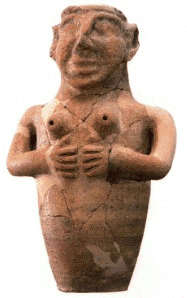


EPISODE 1 - FOUNDATIONS OF PALESTINE
For several decades now, politicians, clerics and school teachers living in the areas known as the Gaza strip, the ‘West Bank’ and ‘East Jerusalem’ have been teaching their children, teenagers and young adults that the whole of the Land of Israel in fact belongs to the Arab people who are today known as the Palestinians. This claim is widely propagated throughout the Palestinian media and education system, and further afield in Muslim dominated countries in the Middle East. The claim goes on to assert that the Jewish people have no historic connection with Jerusalem, and they are in fact trying to Judaise the Holy City, and that the Jewish presence there is ‘illegal’. Moreover, this claim is now becoming widely believed among many in the Western world. So what historic and legal claim do the Palestinian Arabs have over Jerusalem and the Land of Israel?
Jewish writings dating back over two thousand years found among the Dead Sea Scrolls confirm that there was a historic Jewish presence in Jerusalem well before the time of Christ. Archaeological sites in Jerusalem confirm that fact. Christian records confirm that a Jewish temple stood on what the Palestinians call Haram Al-Sharif – or the Temple Mount – at the time of Christ.


The Cyrus Cylinder
Jewish historical records show that Jerusalem was in fact the capital city of the people of Israel a thousand years before Christ. Extra-biblical records, for example, what is known as the ‘Cyrus Cylinder’ from the ancient Persian Empire, which is now housed in the British Museum, confirm that King Cyrus gave permission for the Jews to return to their capital city – Jerusalem – to rebuild the temple that had been destroyed by King Nebuchadnezzar of Babylon.
The Arch of Titus, Rome, showing destruction of the 2nd Temple in Jerusalem
In the year 70AD the Romans destroyed not only the temple, but the entire Jewish capital was destroyed too. The historian Josephus Flavius records that more than a million inhabitants of Jerusalem were killed, and the rest were taken off to Rome as slaves. So how did the Jewish homeland – the Land of Israel – come to be known as Palestine?

Ancient Jerusalem
"Palestine is not even the original name of the Land that is denominated ‘Palestinian Land’. ‘Palestine’ is not a Hebrew word, it is not an Arab word, It’s a Roman word. That land was originally ‘Eretz Israel’. It took the name ‘Palestine’ under later occupations." Dr Cynthia Day Wallace, Author, Foundations of the International Legal Rights of the Jewish People and the State of Israel

Philistine vessel of fertility goddess, Tel Qasile
"The original name is ‘Filistine’ (Hebrew) from the Bible – or Philistines. But they were in the coastal area and basically nothing to do with the name ‘Palestine’. ‘Palestine’ was re-used – Palestine as we know it today – by Hadrian when he occupied the country in 135 (AD) following the Bar Kokhba revolt. He really wanted that [the name] Judea would be forgotten. And that is really why he changed the name to ‘Palestina’ – to Palestine." Dr Shaul Sapir, Historical Geographer at the Hebrew University.

Bar Kokhba Silver Coins
"The final Jewish rebellion against Rome in the early second century, the Bar Kokhba uprising, was brutally quashed by the Romans. Jews were barred from entering their ancient capital city, Jerusalem, until the 4th century. Even though most Jews had either been killed by the Romans, or exiled and taken off as slaves, there were small Jewish communities scattered across other parts of the Jewish homeland. "If it had not been for the Diaspora then the vast majority of the population would have been Jewish. Gradually over the years the Jews had gone mostly to Europe – some had stayed behind – there has always been a Jewish presence." Dr Denis MacEoin, former Lecturer in Arabic and Islamic Studies, Newcastle University